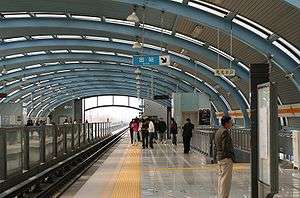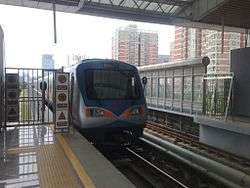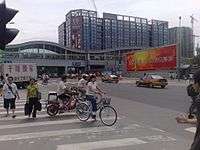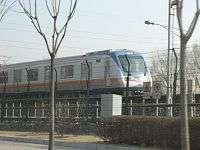Line 13, Beijing Subway
| Line 13, Beijing Subway | |||||||||||||||||||||||||||||||||||||||||||||||||||||||||||||||||||||||||||||||||||
|---|---|---|---|---|---|---|---|---|---|---|---|---|---|---|---|---|---|---|---|---|---|---|---|---|---|---|---|---|---|---|---|---|---|---|---|---|---|---|---|---|---|---|---|---|---|---|---|---|---|---|---|---|---|---|---|---|---|---|---|---|---|---|---|---|---|---|---|---|---|---|---|---|---|---|---|---|---|---|---|---|---|---|---|
|
| |||||||||||||||||||||||||||||||||||||||||||||||||||||||||||||||||||||||||||||||||||
 | |||||||||||||||||||||||||||||||||||||||||||||||||||||||||||||||||||||||||||||||||||
| Overview | |||||||||||||||||||||||||||||||||||||||||||||||||||||||||||||||||||||||||||||||||||
| Type | Rapid transit | ||||||||||||||||||||||||||||||||||||||||||||||||||||||||||||||||||||||||||||||||||
| System | Beijing Subway | ||||||||||||||||||||||||||||||||||||||||||||||||||||||||||||||||||||||||||||||||||
| Status | Operational | ||||||||||||||||||||||||||||||||||||||||||||||||||||||||||||||||||||||||||||||||||
| Termini |
Xizhimen Dongzhimen | ||||||||||||||||||||||||||||||||||||||||||||||||||||||||||||||||||||||||||||||||||
| Stations | 16 | ||||||||||||||||||||||||||||||||||||||||||||||||||||||||||||||||||||||||||||||||||
| Daily ridership |
745,300 (2014 Avg.) 939,300 (2014 Peak)[1] | ||||||||||||||||||||||||||||||||||||||||||||||||||||||||||||||||||||||||||||||||||
| Operation | |||||||||||||||||||||||||||||||||||||||||||||||||||||||||||||||||||||||||||||||||||
| Opened | September 22, 2002 | ||||||||||||||||||||||||||||||||||||||||||||||||||||||||||||||||||||||||||||||||||
| Operator(s) | Beijing Mass Transit Railway Operation Corp., Ltd | ||||||||||||||||||||||||||||||||||||||||||||||||||||||||||||||||||||||||||||||||||
| Depot(s) | Huilongguan Depot[2] | ||||||||||||||||||||||||||||||||||||||||||||||||||||||||||||||||||||||||||||||||||
| Technical | |||||||||||||||||||||||||||||||||||||||||||||||||||||||||||||||||||||||||||||||||||
| Line length | 40.5 km (25.2 mi) | ||||||||||||||||||||||||||||||||||||||||||||||||||||||||||||||||||||||||||||||||||
| Track gauge | 1,435 mm (4 ft 8 1⁄2 in) | ||||||||||||||||||||||||||||||||||||||||||||||||||||||||||||||||||||||||||||||||||
| Operating speed | 80 km/h (50 mph) | ||||||||||||||||||||||||||||||||||||||||||||||||||||||||||||||||||||||||||||||||||
| |||||||||||||||||||||||||||||||||||||||||||||||||||||||||||||||||||||||||||||||||||

Line 13 of the Beijing Subway (Chinese: 北京地铁13号线; pinyin: běijīng dìtiě shísānhào xiàn), also known as The CityRail (城市铁路) (not to be confused with BCR) especially before the opening of Line 5, or erroneously as Light Rail, is a metro line that serves the northern suburbs of Beijing. On a map, Line 13's route is shaped like an inverted U that arcs north of the city and connects residential suburbs in Haidian, Changping and Chaoyang Districts with the 2nd Ring Road and Line 2 at Xizhimen and Dongzhimen. With the exception of Dongzhimen, all of Line 13's tracks and stations are located on the surface or elevated above ground. At 40.9 km, Line 13 used to be the longest line of the Beijing Subway until the line 10 extension opened; 14 of its 16 stations are on the surface. Line 13's color is amber. During rush hours, the section between Xizhimen and Wudaokou Stations is the second most congested section in the Beijing subway network, operating at 130% capacity.[3]
Fare

Starting fare of RMB(¥) 3.00 that increases according to the distance fare scheme introduced in December 2014.
Hours of operation

The first trains depart from Xizhimen and Dongzhimen at 5:35am. The last trains to go the full-distance and reach the other terminus depart from Xizhimen and Dongzhimen at 10:42pm. In addition, Line 13 offers later night trains from either terminus that travel half of the full route. The last train to leave Xizhimen, departs at 11:45pm and ends its journey at Huilongguan at 12:09am. The last train to leave Dongzhimen, departs at 11:45pm and ends its journey at Huoying at 12:09am. For the official timetable, see.[4] The frequency of trains on Line 13 vary from 3.5 minutes per train during the morning rush hour (6:20am–9:40am) to 5 minutes per train during the evening rush hour (4:40pm–8:40pm) to 10-11.5 minutes per train after 10:50pm. For full listing of train frequency, see.[5]
Route
Line 13's route is shaped like a horseshoe over northern Beijing. From Xizhimen in Xicheng District, Line 13 heads north, running alongside the Beijing-Baotou Railway into Haidian. After three stops in the bustling university district -- Dazhongsi, Zhichunlu (transfer to Line 10) and Wudaokou—Line 13 leaves the 5th Ring Road and enters the suburbs of northern Haidian. At Xierqi, Line 13 meets the Changping Line, and turns east, following the southern edge of Changping District for three stops (Longze, Huilongguan, and Huoying), before turning to the southeast. It enters Chaoyang District at Lishuiqiao (transfer to Line 5) and curls southwest after Beiyuan onto the Beijing-Chengde Expressway. At Wangjing West, Line 13 intersects with Line 15. After entering the 3rd Ring Road at Guangximen, the line runs straight south, along the remnants of the eastern earthen wall to Liufang. Then, Line 13 goes underground to Dongzhimen in Dongcheng District where transfers are available to Line 2 and the Airport Express.
Stations (from West to East)
№ |
English |
Hanzi |
hours |
km |
|
|
|
| 1301 | Xizhimen | 西直门 xīzhímén |
0:00 | 0.0 | 4 2 |
7 16 21 26 27 44 80 84 87 105 111 332 347 360 362 375 387 392 438 534 563 606 618 632 651 691 693 694 特12 特15 夜8 夜14 夜20 夜21 运通104 运通105 运通106 专6 | Xicheng |
| 1302 | Dazhongsi Big Bell Temple |
大钟寺 dàzhōngsì |
0:03 | 2.8 | — | 80 87 88 94 123 300 302 315 361 425 609 617 658 695 特8 夜30 运通101 运通201 | Haidian |
| 1303 | Zhichunlu Zhichun Rd. |
知春路 zhīchūnlù |
0:05 | 4.0 | 10 | 79 88 304 311 386 579 601 630 653 671 751 夜9 | |
| 1304 | Wudaokou | 五道口 wǔdàokǒu |
0:08 | 5.9 | — | 86 307 331 375 398 429 508 549 562 630 运通126 专12 | |
| Qinghuadongluxikou | 清华东路西口 qīnghuádōnglù xīkǒu |
— | — | 15 | |||
| 1305 | Shangdi | 上地 shàngdì |
0:13 | 10.8 | — | 447 448 449 521 681 运通123 运通205 专28 专60 | |
| 1306 | Xierqi | 西二旗 xīèrqí |
0:16 | 13.2 | Changping | 333 362 509 521 544 570 636 664 717 963 运通112 运通114 专34 专82 | |
| 1307 | Longze | 龙泽 lóngzé |
0:21 | 17.0 | — | 307 428 441 443 463 519 543 625 878 996 专31 专53 专102 专103 | Changping |
| 1308 | Huilongguan | 回龙观 huílónguān |
0:24 | 18.4 | — | 371 443 460 461 557 560 636 681 878 880快 887 专89 专101 专102 专121 | |
| 1309 | Huoying | 霍营 huòyíng |
0:28 | 20.5 | 8 | 371 462 478 551 558 607 681 专21 专42 | |
| Jiancaichengdonglu | 建材城东路 jiàncáichéng dōnglù |
- | - | ||||
| 1310 | Lishuiqiao Lishui Bridge |
立水桥 lìshuǐqiáo |
0:33 | 25.3 | 5 | 301 319 426 430 464 465 558 617 620 621 751 905 966 984 BRT3(快速公交3) BRT3区(快速公交3区) 运通117 运通128 专81 昌平22 昌平27 昌平52 | Chaoyang |
| 1311 | Beiyuan | 北苑 běiyuàn |
0:36 | 27.6 | — | 466 484 530 596 621 653 695 966 特11 夜26 运通128 专20 专81 专107 | |
| 1312 | Wangjing West | 望京西 wàngjīngxī |
0:44 | 34.3 | 15 | 445 471 538 547 571 851 854 882 905 928 970快 985 987 运通110 专112 | |
| 1313 | Shaoyaoju | 芍药居 sháoyàojū |
0:47 | 36.5 | 10 | 119 515 547 567 696 942快 专22 | |
| 1314 | Guangximen | 光熙门 guāngxīmén |
0:49 | 37.6 | — | 130 300 302 379 419 547 596 671 847 848 866 916快 942快 980快 984 特8 夜18 夜30 运通104 | |
| 1315 | Liufang | 柳芳 lǐufāng |
0:51 | 38.7 | — | 104 110 116 123 130 夜24 | |
| 1316 | Dongzhimen | 东直门 dōngzhímén |
0:53 | 40.5 | 2 Airport |
3 18 24 44 75 106 107 117 123 130 131 132 359 401 404 413 416 418 612 635 850 850快 852 855 866 867 909 915 915快 916 916快 918 935 935快 936 942 942快 966 980 980快 特2 特12 夜6 夜10 夜20 夜32 | Dongcheng |
- As of May 18, 2016, Qinghuadongluxikou Station is not yet a transfer station for Line 13; however, this change is included in the subway plan for the year 2020.
History
Line 13 was opened in two phases: The western section between Xizhimen and Huoying was opened on September 28, 2002; the eastern section from Huoying to Dongzhimen was opened on January 28, 2003. Despite being numbered 13, the line was only the third subway line to enter into operation. It was the first Beijing Subway line to adopt Yikatong, the electronic farecard, at the end of 2003.
Rolling stock
Current

- DKZ5 trainsets #H401, #H403-H456
- DKZ6 trainset #H402
The rolling stock maintenance facility is located at Huilongguan. From mid-2008 to early 2009, all Line 13 trains were converted from four cars per train to six cars per train.
Former
- DK3 trainsets #H101-H114
- DK4 trainsets (transferred from Pyongyang Metro)
The DK4 trainsets, originally built in the early 1970s by the Changchun Car Company, were delivered to Pyongyang Metro in anticipation of its opening in 1973. Some of them were returned to China in 1998 and were used on Line 13 when it opened in 2002 until they were eventually replaced by newer DKZ5 and DKZ6 trainsets (it is unknown if they were returned to Pyongyang).
- DK16 trainsets #H115-H118
- DKZ1 trainset #H302
- DKZ10 trainset #H457
Trainset number H457 has exited service; this train was fraught with quality issues and came in a different livery than other trains.
- M trainset #H301
- BD8 trainset #H303
References
- ↑ "Official Ridership". Beijing Subway. Retrieved 2013-03-10.
- ↑ "地铁10号线万柳车辆段封顶". 2007-08-26. Retrieved 2009-02-04.
- ↑ "我市轨道交通网络化运营效果凸显". 北京市交通委员会. 2013-02-07. Retrieved 2013-09-15.
- ↑ Archived October 24, 2008, at the Wayback Machine.
- ↑ Archived October 5, 2008, at the Wayback Machine.
External links
| Wikimedia Commons has media related to Line 13, Beijing Subway. |
| Wikimedia Commons has media related to Beijing Subway. |